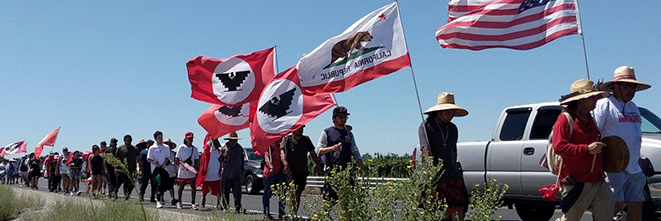
Send your message of encouragement to workers negotiating first contracts
United Farm Workers ¡Si, Se Puede!®

Send your message of encouragement to workers negotiating first contracts
Asusena Viramontes, a daughter of Gallo farm worker shares, “I am very grateful for the UFW scholarship. Thanks to my father, Manuel Viramontes, who has been a dedicated farm worker for more than twenty years and a member of UFW, I was to able to apply the scholarship. His hard work and dedication is my motivation to strive for a better future. Growing up my father always told me, “Echale ganas al estudio, Si Se Puede.” He was right, I recieved the scholarship and now I am at Sonoma State University studying biology, one step closer in achieving my dreams of becoming a dentist. Once again, I am very grateful, Si Se Puede!”/Asusena Viramontes, hija de un trabajador de Gallo Farm nos compartió lo siguiente, “Estoy muy agradecida por la beca de La Unión de Campesinos (UFW por sus siglas en inglés). Gracias a mi padre Manuel Viramontes, que ha sido un trabajador campesino dedicado desde hace más de veinte años y un miembro de la UFW, pude solicitar la beca. Su arduo trabajo y dedicación es mi motivación para luchar por un mejor futuro. Al crecer mi padre siempre me decía, “Échale ganas al estudio, Si Se Puede”. Él tenia la razón, recibí la beca y ahora estoy en la universidad Sonoma State University estudiando biología, a un paso más de lograr mi sueño de convertirme en dentista. Nuevamente, estoy muy agradecida, ¡Si Se Puede!”.
Since last year when I worked for piece rate, they’ve paid for my break(s). They paid me $3.50 for each break and I earned $7 more each day. I earned between $21 and $42 more each week in my checks. I use this money for gas or to pay for child care for my nine-year-old daughter and four-year-old son.” Grape harvester, Severiano Salas, 34/ “Desde el año pasado cuando trabaje por pieza me pagaron por mis descanso(s). Me dieron $3.50 por cada descanso y gano $7 cada día mas. Gano $21 o $42 mas a la semana en mis cheques. Yo uso ese dinero para gasolina o el cuidado de niño a mi hija de 9 anos y hijo de 4 años.” Pizcador de uva, Severiano Salas, 34. #fightfor15
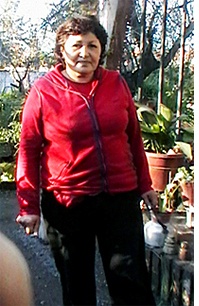
Rosa Escalona is a Chilean farm worker who harvests and packs some of the fruit going to Nature’s Partner. She believes the chemicals used to make the fruit more marketable are also making her sick.
She describes the following:
“When the time comes to apply the pesticides they do not allow us to leave the room. They apply many liquids, some are specific, like to enhance the color of the fruit, without regards to the fact that there are many young women who someday may have little children and may suffer risks due to the chemicals. The same fruit that is produced is not normal; for example to the cherries they try to give it a redder color and one time they put something too strong that we were choking.”
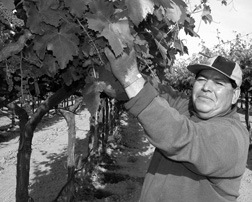
Teodoro Gutierrez noticed dirt in what was supposed to be his crew’s drinking water. He decided to let his foreman know to change it. Instead of providing workers with clean, drinking water, the foreman threw the dirty water out and left the crew thirsty for the remainder of the hot work day. “The foreman, they always cheat us,” he said.

Tarino Carlos says his wife Luz is as beautiful today as when they first met. The only thing he worries about when he thinks of their relationship is what they will do for income when they are both too old to work. Employed by companies without union contracts, neither have any type of retirement plan. As he nears 80, he stresses the importance of organizing among his younger coworkers. “I tell them, wherever there is a union, there is hope.”
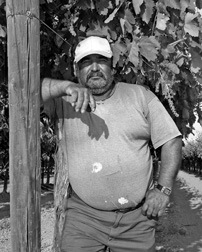
Valentine Gonzalez’ eyes burn every morning. It’s from the pesticides sprayed on the grapes the night before. When working, sometimes he gets thirsty, but there are times when no drinking water is available for hours. The company pressured workers when they tried to join the UFW to make things better. “We were told if the union wins, we’d lose,” he said. “No more work.”
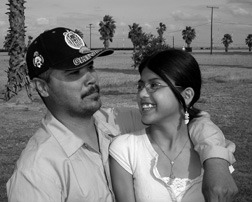
Manuel Nunez watched one of his female coworkers get fired after failing a required physical fitness She had just had a cesarean section and was not able to lift the weights. He remembers how she cried. It made him think of Patricia, his own daughter and how he wants better for her. “I tell her to finish school and get a degree,” he said. “That is my hope for her.”
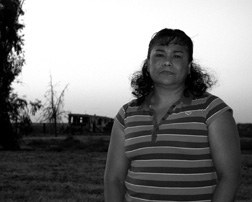
Lucila Lopez considers herself a strong woman. A mother of four children, she has worked in grapes for more than 20 years. A U.S. resident, Lucila says she is tired of pity. “When we are treated badly, we should blame ourselves. We shouldn’t be afraid to stand up for our rights.”
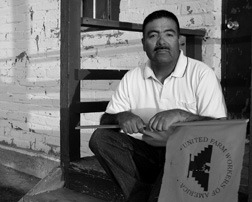
Sabas Arrendondo worked more than five years at the same company before restrooms were installed onsite for workers to use. During that time, he was forced to work under four different Social Security numbers. “The majority of farm workers are too scared to organize,” he said. “They tell us if we try to join the union, we’ll get fired.”
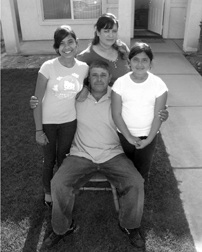
Baltazar Aguirre believes that workers, who feel they are respected, work better. He has been a union member since 1975. The union, he says, has made it possible for him to own the house he does, benefit from a strong medical plan and enjoy time with his family with paid holidays and vacation time. “Without the union, I would have suffered much more in my life,” he said.
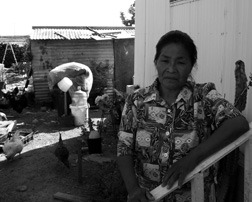
After being sick, Maria Carrillo was forced to pass a physical exam in order for her to return to work. Having to ride a bicycle and lift weights was difficult for Maria. She grew dizzy from the exercises and failed her exam. She was fired as a result. “I don’t understand how me taking a physical exam where I have to ride a bike is important,” she said. “I don’t work riding a bike in the fields.”
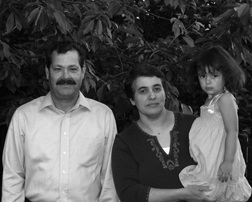
Aurelio Solario believes he is singled out by his company and harassed because of his age. “They are afraid of the leadership us older workers carry,” he said. “They’d rather implement a new and younger workforce that will labor for lower wages, without benefits and will know less about the rights they are entitled to,” he said. “Such a workforce is more vulnerable.”
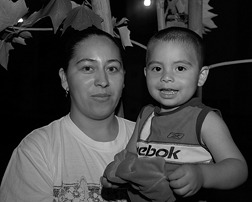
Miriam Flores remembers watching her supervisors getting angry at workers because they were singing in the fields. “The supervisor said he wouldn’t pay them because they were singing,” she said. “I felt the boss had no right to silence them. They weren’t doing anything wrong. What’s wrong with being happy at work? It’s a field – there is plenty of room to sing without interfering with anyone else’s job.”
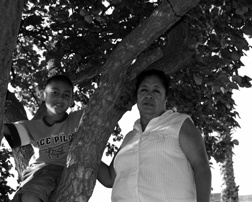
Gloria Ramirez says female workers suffer most in the fields. “If a young female worker doesn’t give into her supervisor’s sexual requests, he will fire her or make her life a living hell. He’ll punish all of us for days – with no food, water or restroom breaks.” She says the break times workers are given are not long enough. “The bathrooms are located too far for us to use,” she said. “There have been times I have really had to use the restroom, but they are so far, I could not make it in time and accidentally had to urinate on myself.”

“Our bosses simply do not fear the law,” said Manuel Cruz, who has spent nearly 30 years working in the fields and watching workers be exploited over and over again. He says it’s the financial hardship that farm workers have that keeps them silent. “We have a need to work,” he said. “If we say something, we fear we will lose our jobs. Many workers do not speak out – we have seen too many get fired for doing so.”
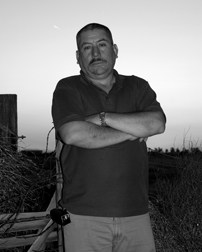
Bernardo Hernandez says working in the heat is the hardest part of his job. “The foremen, they just work us too hard,” he says. “We get so tired from the heat.” He also says the restrooms are hardly cleaned. “I feel sorry for the women,” he said. “There are so many of them and only one restroom.”
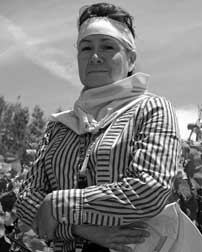
Ofelia Flores has worked under a union contract for almost 30 years. She believes her work is important. “My work is significant,” she says. “I pick wine grapes, and wine is something universally known throughout the world. I like to think of how people enjoy wine and how what I do helps contribute to the enjoyment of so many.”

Before working under a union contract, Antonio Vargas says he was always behind on his bills and had many financial hardships. “Thanks to the UFW, I was able to regain solid ground financially,” he said. “Workers need to understand the many benefits the union brings them,” he said. “They also need to be given the chance to benefit from the cause.”
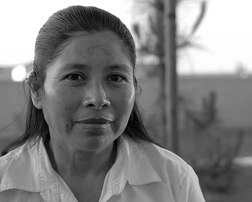
Margarita Hernandez was fired after working one day and not meeting her foreman’s quota. “The owners want the workers to get a certain quantity done by a certain time and oftentimes, it is simply not possible,” she said. “What saddens me the most is they just fire us without giving us an opportunity to explain ourselves.”
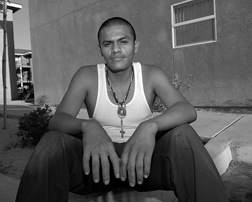
Jairo Luque works for an organic carrot farm where the portable restrooms in the field are hardly cleaned. “They smell horrible,” he said. The restrooms are hitched to trucks and moved around the fields for workers to use. Recently, a restroom that needed to be cleaned and emptied out was moved, and Jairo witnessed urine spilling out on the organic carrots. “If the public knew about this, I don’t think anyone would want to eat the carrots,” he said. “I know I wouldn’t.”
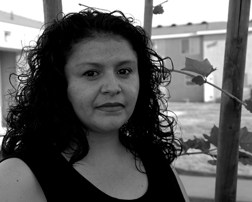
“I knew I wasn’t alone anymore…” was how Evelyn Aguilar said she felt when she realized the UFW was designed to protect her rights. Prior to joining the union, Evelyn was sexually harassed by her foreman. What made her feel worse was she never had the courage to say anything despite knowing what he was doing was wrong. The union has since changed her perspective. “I have a voice now,” she said, “and, I’m no longer afraid to use it.”

Juan Manuel Nunez Alvarado believes his life is better because of the UFW. Before he worked under a union contract, working conditions were poor. “We’d be given 10 minutes to eat our lunches – with no other time to rest,” he said. “I also often saw the foreman harass the female workers and mistreat the males.”
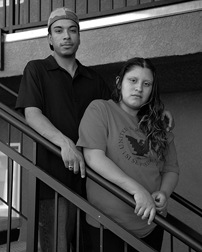
Every day that Eva Zenteno goes to work, her mom is there. They work for the same company. She remembers how once her mom wanted to take her break. “The foreman started yelling at her for sitting down,” she said. “He called her a ‘useless cow.’” A new mother, Eva never wants her daughter to hear anyone speak to her that way. “It angered me,” she said. “It was so humiliating and offensive.”
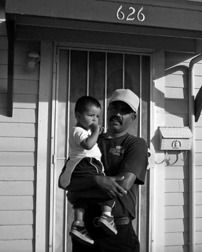
Raul Medrano has worked 15 years at the same company. Throughout his tenure there, he has not seen one wage increase. Raul says he believes the lives of his coworkers would be better if his company had a union contract. “The company is making millions in profits,” he said. “They only care about the money. They don’t care about their workers.”
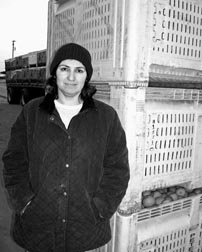
Mirna Vasquez is a U.S. citizen. Working in the citrus industry, Mirna is fully aware how much damage a little frost can bring. She has worked through two freezes in the last decade. She said the UFW helped her family survive both. “During the months of the freeze, the UFW helped me find employment and my family received periodic food donations,” she said. “I am always confident they will help us.”
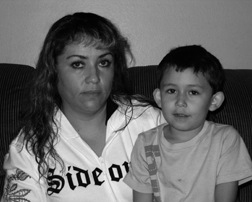
After working 13 years for the same company, Margarita Galarza was fired after her company decided to bring in an entirely new workforce. Despite her struggles to find new work, Margarita says she has not given up hope. “I am going to continue fighting until companies stop exploiting workers or firing them whenever they feel the want to do so.”

After working seven years for the same company, Manuel Ruiz was fired after his company decided to bring in an entirely new workforce. He now works as a day laborer to make ends meet. “Working only once or twice a week is the only way I am able to bring food home to my kids,” he said. “I feel very sad and depressed about our current situation.”
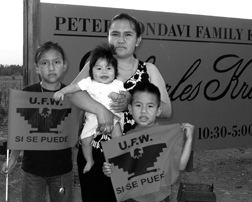
Lorena Martinez had let her supervisors know in advance about the time off she would need to have her baby. They reassured her she could return to work after her baby was born. While on maternity leave, she learned that she was fired. “Our newborns need time with their mothers. They should not be at fault for the actions of our management. I want to go back to work. I have children to provide for – I must continue working.”

Jorge De Haro does not believe workers should be forced to pass physical exams in order to work. He believes it is the company’s way of discriminating against some of the older workers. “If we don’t pass the exercises, they can fire us,” he said. “After working 33 years of my life for the same company, this is how they compensate us? By kicking us out into the street?”
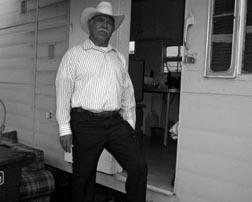
After working 13 years for the same company and never having problems, Fidel Arriaga started noticing his supervisors treating him differently. “They realized I was getting older,” he said. “They always try to get rid of older workers like me.” His supervisors started to demand more work from Fidel just to pressure him and began threatening him with his job if he could not meet their work quotas. “They made me feel ashamed of myself,” he said. “My work is all I have. I don’t know how I will survive without it.”

“I need the union so I can have a better life,” said Alfredo Alvarenga. Working for more than 20 years in the fields, Alfredo has never worked under a union contract. He’s given 10 minutes to eat his lunch for the day. “Workers need to eat like animals to be done in time,” he said. “I know workers who work at companies with union contracts. They have a sense of power about where they work. They know they are worth something.”

Alejandro Garcia has been singled out by his company for being pro-UFW. “The company tries to intimidate me that they’ll fire me,” he said. Still, he says, he will continue to fight for a union contract. He says they are not asking for anything unreasonable. “All we are asking is for the company to sit at the table with us and negotiate a contract in good faith with the workers and with the union,” he said.

Gonzalo Picasso Lopez believes one day, his company will have a union contract. “I am 100 percent sure the UFW can get us one,” he said. “The people in the fields, we need union contracts. Otherwise, we have no medical plan, no pension – nothing, nothing, nothing.”

Ramona Aguilar says she feels fortunate to work under a union contract. “Other companies treat their workers so badly,” she said. “It is a little difficult because of the heat, but we have good insurance and the water is in good condition and the restrooms are clean,” she said.

Jorge De Haro does not believe workers should be forced to pass physical exams in order to work. He believes it is the company’s way of discriminating against some of the older workers. “If we don’t pass the exercises, they can fire us,” he said. “After working 33 years of my life for the same company, this is how they compensate us? By kicking us out into the street?”
When Carmen Medina’s son was born prematurely, she was not worried at first about going on maternity leave. She had worked out the details months in advance with her supervisor. Yet, in April, while tending to her newborn, Carmen discovered she had been fired while away. “I felt very bad and disgusted because it showed how the company does not understand a women’s necessity to take and be on maternity leave,” she said. “All the company cares about is getting richer and working us like slaves in the process.”
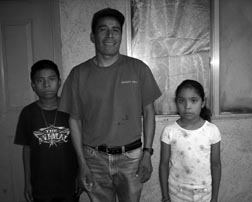
Benito Zeferino makes less than minimum wage and has a family to support. “We are so thankful our children our healthy because we cannot afford any medical insurance for them,” he said. “When our children do get sick, we have to pay with money that we don’t have. This puts a strain on our ability to pay our basic necessities, but what are we to do?”

With 38 years of experience working in the fields, Luz Carlos knows about horrible working conditions. Blood tests show she has pesticides in her bloodstream. She remembers kneeling to work in fields so dirty that the next day all the female workers suffered from vaginal infections and rashes. “People really have no idea what farm workers have to endure,” she said.
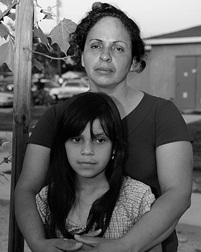
While nearly seven-months pregnant and working in the fields, Maria Rosario Chocoteco left her row to go to the restroom. Being an open UFW supporter, Maria’s supervisor harassed her often. “He watched me go into the restroom,” she said. “He went into his truck [that was hitched to the portable restrooms] and decided to move it. Meanwhile, I was inside. The toilet started leaking and with the movement, I was hit hard in the stomach. I had to stop working.” No one ever checked to see if Maria was hurt. Years later, she believes her son’s learning disability is a result of the incident.
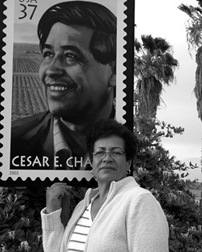
Margarita Mendez remembers Cesar Chavez. “He had a calm presence,” she remembers. “But he could fill any room with his energy and strength. Together with Cesar, we fought and won good fights: drinking water, restrooms and 10-minute breaks.” Although Margarita says many successes have been won in recent years, there is much work to be done. “There is still a need to fight for the farm workers,” she said.
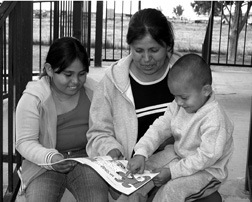
Leticia Aburto remembers asking her boss for time off when her youngest son was sick with asthma. “He asked me, ‘What is more important? Your job or your sick child?’ I left right there. The most important thing is my child,” she said. “It is very sad. I care about my job. I pay rent, bills, we need to eat, but my son was sick. The bosses, they just don’t care.”
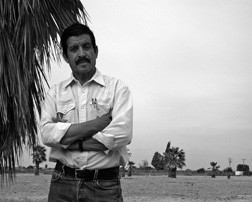
When Pablo Alvarez’ sons were teenagers, he gave them two choices – either study or go to work in the fields with him. “I’d ask them, ‘Do you want to go burn in the hot sun and get paid minimum wage to do it?’ And they’d always answer, ‘No! I will finish high school.’” Looking back, he says his strategy must have worked – all his children finished school and not one is working in the fields.
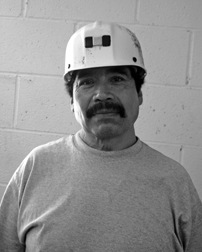
Reynaldo Arevalo has picked mushrooms for 16 years. He says the union has not changed his life as much as it has helped improve it. “Before the union, we never received raises, had vacation time or any paid holidays to spend time with our families. If my foreman asked me to do something, even if I thought it was wrong, I had to do it. With a contract, I can voice my opinion without the fear of losing my job.”
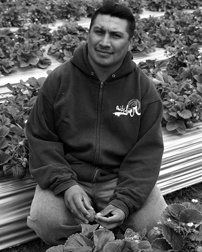
Sergio Andrade is 26. He says he is thankful his company has a union contract. “The union has helped us tremendously,” he said. “We need union representation because many people don’t care about us, our lives just don’t affect them.”
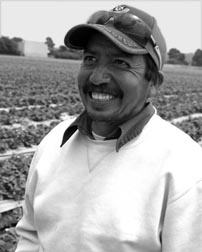
Rufino Vega has five children. Before his company signed on with the union, he said health care was too expensive to provide. “But now, I don’t have to pay anything because the union provides me and my children with one of the best insurance providers,” he said. He doesn’t want to see his children work in the fields. “An education is essential for them to have a better future.”

Olga Velado has spent the last 32 years of her life working for a company that refuses to promote women to better paying positions. The discrimination angers the female workers. “Women are not even taken into consideration for the higher-paying jobs,” she said. “The company believes the men are more capable. We are just as capable as the men. In some cases, we are even more capable.”
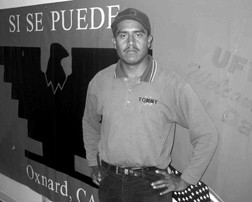
Daniel Navarrete knows the life of a farm worker is not easy. “We work despite the conditions,” he said. “It may be raining or freezing, yet we believe we must fulfill our working responsibilities.” Working under a union contract, he said, makes things better. “We have job stability. We also have benefits, such as health care and worker’s compensation packages because of the UFW.”

Maria Cervantes works for the only grape company that makes workers pack grapes on their knees all day. From kneeling in the soil, her knees are stained. She says she feels embarrassed to go to parties unless her knees are covered. She also says she can tell when the fields have been sprayed with pesticides. “Once I had to tell my husband I couldn’t keep working. I had to leave I felt so nauseous.”
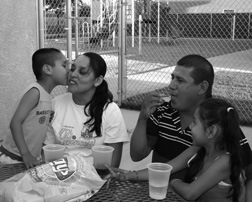
Aaron Miranda picks grapes with his wife Monica at the same company. He said the most difficult thing is watching his wife work in uncomfortable conditions. “She has allergies,” he said. “And a particular plant they let grow in the fields makes her very sick. I told the foreman and supervisor, but they were of no help. I had to take her to different doctors to get her allergies under control.”

Monica Martinez prefers to wear long pants to any i gathering. After working eight years on her knees packing grapes for 10 hours-a-day, her knees are stained the color of the earth’s dark soil. She’s tried scrubbing them, but the stains hold firm. Her grape company is the only one left that makes its workers pack all day on their knees. “The black spots, they just won’t come off,” she said.

Tired of her checks being shorted regularly and pressure from her supervisors to work faster, Leonar Ramos believes the UFW should enter every ranch and increase awareness among workers of the benefits the union can bring to their lives. “All people need to know their rights in the workplace,” she said. “That includes farm workers.”

Rocio Ontiveros used to cry over how one of her supervisors harassed her. When she first started learning to work in grapes, he would call her a “monkey” and tell her she did not know what she was doing. He yelled at her constantly, at one point, throwing grapes in her face. “No one fought back,” she said. “We needed our jobs. We all have families to support.”
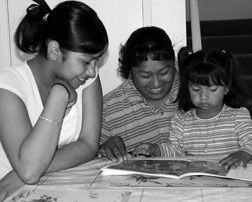
Esther Hernandez’ (center) day begins at 4 a.m. She must make her children’s lunches for school and pick up her house before her workday begins at 7. She then works nine-hours-a-day packing grapes in carts with the majority of her workday spent on her knees. Although she is tired, she always tries to spend quality time with her daughters, Erika (left) and Cecilia (right). “I never want to see my girls in the fields,” she said.
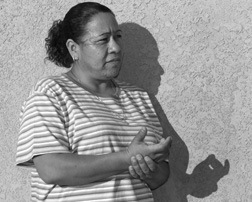
Imelda Valdivia packs grapes. Her hands are the tools that guarantee her pay check. For the last few years though, she has suffered from Carpel Tunnel in her right hand. She tried to explain her pain to her supervisors, but they said she still had to keep up with her other coworkers. “My hand was too swollen to work,” she said. “I decided to pick with one hand. Within a week, my good hand was hurt from using it so much.”
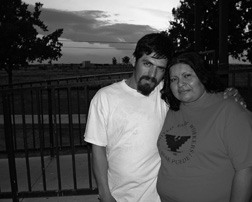
Jorge Rodriguez knows firsthand how important it is to have California laws protecting farm workers from heat exposure. Last summer, while working in almonds, he watched many of his coworkers suffer. “There was never water for us,” he said. “We could only take breaks when we were told.” He remembers people fainting. “They would vomit; they’d pass out and then be able to go home.”

Maria Elena Castillo hopes when she has children, she does not have to work in the fields. She knows how hard it is for her coworkers to balance working in the fields and family life. “By the end of the day, we are exhausted,” she said. “Mothers tell me they have no time or energy to spend with their children. They only have enough left to feed them and put them to bed.”
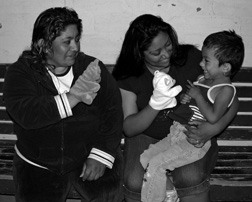
Alba Castillo (center) is the oldest of her siblings. She graduates high school in one year. She plans on studying to be a medical assistant. While other kids are on summer vacation, Alba helps her mom Zeferina (left) work in the fields. “The restrooms are the worst,” she said. “They don’t clean them. You just hold it all day instead of use them,” she said. “I ended up getting a bladder infection.”

Zeferina Castillo takes her daughter Alba (center) to work with her in the fields when she is on summer break from school. She wants her to see how hard it is and stay in school. “I tell my kids to study hard,” she said. “I didn’t come here for an education. I came here only to work. Alba and Jeymi (right) have the chance to get educated. I never want to see them in the fields.”
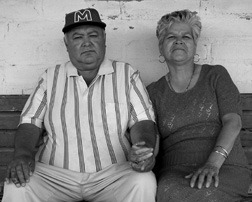
Lilia Alvarez’s youth is filled with memories of how hard she worked in the fields, often pushing wheelbarrows that were too heavy for her. She hurt herself once and reported it to her foreman. She was ignored. “The foremen don’t care,” she said. “People suffer working in the fields.”

When his wife was sick and needed surgery, Rafael Alvarez was calm when the doctor told him the procedure would cost more than $50,000. He knew he and his wife were covered by the UFW’s Robert F. Kennedy medical insurance plan. “I have faith in the UFW,” he said, “I have seen in my own life how much the union works to help farm workers.”
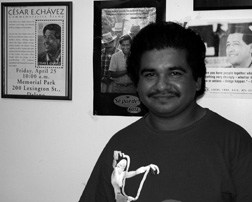
Nicanor Rojas remembers the day he quit his job picking cherries after the foreman yelled and threw fruit at him. After working all day, the foreman noticed Nicanor had left one cherry on the tree. After the foreman’s angry reaction over it, Nicanor decided to quit. “Supervisors always yell at us to show off who is stricter,” he said.
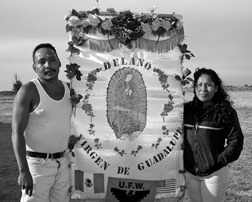
Sabino Reboyedo and his wife Anita believe all companies should have union contracts. After injuring himself while on the job and knowing he was mistreated by the company, Sabino turned to the UFW for help. “Their support has helped me keep moving forward with my life,” he said.
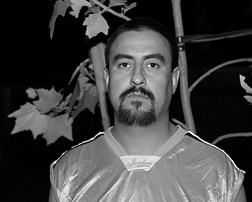
Hector Carbajal does not like to complain about his job, after all, it is his livelihood. The one thing he does not like is when he is forced to buy his own work equipment. “They make us buy our own gloves, glasses and scissors,” he said. “That can cost up to $20. If we refuse to buy it though, they will fire us.”
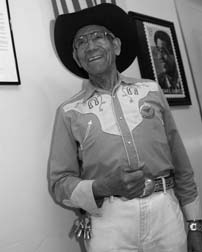
Adan Ramirez carries much wisdom in his years. He has seen many changes for farm workers over the years. He says the older he gets the less likely he is to change his beliefs. The one belief he always holds firm – “The farm worker is the most mistreated of all, yet it is the farm worker who feeds the world,” he said. “No one else wants to do this work. Everyone needs us – the entire world needs farm workers.”

Just because Sebastian Gonzalez is yelled at daily by his foreman, doesn’t mean he’ll ever get used to it. “We’ll work nine hours straight and he’ll still yell at us that we’re useless,” he said. Sebastian believes if his company had a union, things would be better. “People must stand up for their rights and unionize,” he said, “but everyone is afraid to get fired if they do.”
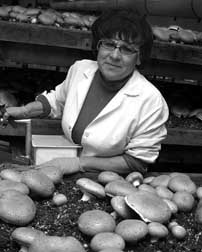
Julieta Reyes says she lives a good life. Much of it, she says, she owes to the UFW. Working under a union contract, Julieta is able to make a decent living wage – almost $32,000 a year. “It’s about more than just the money,” she said. “It’s about being seen as a human being. For decades, people have fought for the union. I thank God I am benefiting from their sacrifices.”
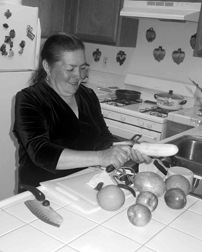
With nearly 30 years of experience working in the fields, Estella Gutierrez knows firsthand the differences between working with or without a union contract. “The difference between the two is huge,” she said. “First of all, we are treated like human beings and not animals. We are also respected by our supervisors. With a union, workers are given a voice and the chance to positively change their lives.”
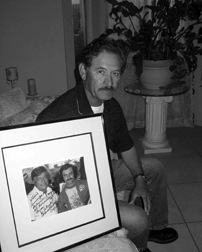
Hilario Torres believes in the vision of Cesar Chavez. Throughout his farm-working years, Hilario devoted a significant portion of his time toward organizing farm workers. “I believe it is necessary to help workers,” he said. “Looking back, I know I made many sacrifices for the union, but I believe that in life, we all need to give of ourselves … just like Cesar did.”
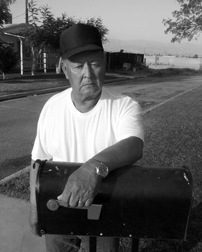
Armando Sanchez has worked 40 years in agriculture. He has been cheated many times by foreman over the years. “They tell you that they’ll pay you by the number of plants you pick, and then you work your hardest and in the end, they decide to pay you hourly – so you get just eight hours of pay after working so hard.”
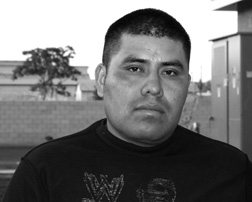
Domingo Ignacio is forced to work up to seven hours straight without breaks. Making less than $8 an hour is difficult, he says. The hardest part for him, however, is not having any type of medical plan. The last time he was sick, his supervisor accused him of being drunk when he struggled to finish his workday. “The company doesn’t help us pay for doctor visits,” he said. “On my wages, it’s hard enough to survive as it is.”
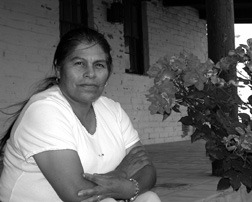
Margarita Gonzalez dreads the summer months when she has to work up to nine hours outside in the hot sun. Despite California laws designed to protect farm workers from heat exposure, Margarita’s experiences reveal the laws are not always enforced. “We sweat a lot and feel like fainting. We want to sit in the shade, but if you sit down, you will get fired.”
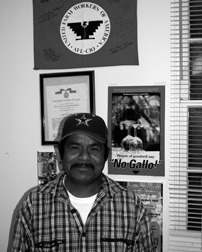
Being forced to work on his knees is something Juan Leon says he will never do again. “After working like that for hours, our knees hurt and we had to get up to stretch our legs,” he said. “I remember how angry my supervisor was because we stopped working. I will never again work for that company.”
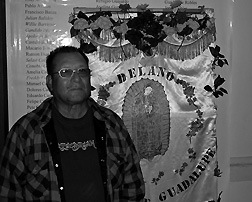
Jose Lopez believes that being a farm worker is a very skilled job. In fact, he says most people could not handle the hard work involved. “We work in fields with dangerous pesticides. We work long hours. We work in the heat. The truth is, no one wants this work, but we are the ones working in the fields.”

I worked in the crew of Manuel Brisefio with Farm Labor Contractor Russell Contracting in the fields of VBZ in the 2006 season, harvesting grapes. I was making $7.00 an hour.
I have been working for Russell Contracting for two years. Working conditions under Russell contracting have been awful. The bathrooms were always dirty without toilet paper. The portable toilets door did not have a proper lock; instead a cord was put in its place, the cord we had to constantly pull with one hand otherwise the door would fling open and with the other hand we had to cover the gaping hole where the lock would have been. The hole was large enough that we had to constantly cover otherwise our coworkers would be able to see inside. No hand washing soap or water was provided.
The provided drinking water had an awful taste.
The foreman always insisted to every worker that they should produce the same number of boxes for the harvest. We were always asked to arrive half an hour before our scheduled time to advance our work by half an hour. Our given daily goals were so massive we had no choice but to work during our breaks, for if we didn’t we would fall behind and would be terminated from work as a consequence.

I worked in the crew of Irma “Choco” Alarcon with Farm Labor Contractor Russell who worked the fields of VBZ in the 2006 season, harvesting grapes. I was making minimum wage of $6.75 an hour.
My family and I have worked many years with farm labor contractors and this one was especially terrible. The bathrooms were filthy; we could not even eat in comfort from the stench that came from them. They always put them far away so that we did not have to smell them but then that caused us to have to walk a long while to use the bathrooms. They did not provide enough bathrooms to the crew since there were only four (4) bathrooms and we had 65 workers in our crew.
When we started working with this crew, the forelady told me and my family who also works alongside me that we had to wash our trays that we used to carry the grapes on our own time. After a long day’s work, we still had more work to do at home. Even though it is California law and we are only making minimum wage we still had to buy our own scissors that we used to pick the grape if we wanted to work. We also had to come in early before work and prepare our work area by placing labels on the boxes, getting a wheel barrow and table for us to pack in. Something needs to be done. I noticed that most of the company crews did not have to do this but the farm labor contractor crews did.

I worked in the crew of Nemecio Panchillo with Farm Labor Contractor Chester Longboy also known as “Macario Santacruz” who worked the fields of VBZ in the 2006 season, harvesting grapes. I was making minimum wage of $6.75 an hour
This was my first year with this farn labor contractor but I have over 10 years working in the fields with farm labor contractors and this farm labor contractor inexplicably would come and belittle us and yell at me and my co-workers. The bathrooms were always dirty and sometimes as much as a week would go by without them being cleaned. Some of the women in the crew would use the men’s bathroom instead since theirs was unbearable. When the foreman would go and move the bathrooms to another site, the stench was so unbearable that I would go deep into the rows just to get away from the smell. The crew had 54-60 workers in the crew and we only had the use of one bathroom each for the men and women.
The foreman was constantly telling us that we had hurry up and we worked as hard as we could but sometimes, we could not keep up the pace. The foreman had family working in the crew and he always would go and help them so that they were always ahead of us. He would tell us that that the other crews were doing much more work than us and try play us against each other. When we were doing the deleafing a company supervisor would be at one end of the row and the foreman would be on the other end. If they saw any minor error, the supervisor would make us run back and clean it up and which caused us to get further behind the rest of the crew.
When we started working with this crew during the harvest, the foreman told me and my wife who also works alongside me that we had to wash our trays that we used to carry the grapes on our own time. He would tell us, “If your tray is not clean, you will be fired.” I sometimes would have to take my own tray to work because the one they provided was so old and broken that it was useless. I had to bring scissors and all other materials needed to work. We also had to come in early before work and prepare our work area by placing labels on the boxes, getting a wheel barrow and table for us to pack in. Since the quotas for the day was so high, some of the workers would try to get ahead and meet the day’s quota by staring early and working through their breaks and lunch hour. I overheard a supervisor tell the foreman that he did not want to see anyone putting labels on the boxes during work time.
The foreman would also place 12 to 14 extra names on the payroll to be able to collect extra checks even though they were not working and make extra money on the side.
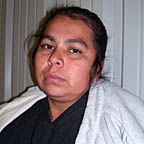
I am 29 years old and a single mother to three children, a 9 year old girl, 7 year old boy and a 2 year old baby. My husband passed away 2 years ago. My husband’s passing put a strain on our finances but between me and my mother in law which lives with us we have been able to get by.
I’m getting worried now. Both my mother in law and I work in the citrus industry. She was laid off from the fields in December and hasn’t worked since. I expect to be laid off within days. I’ve started to look for work but there aren’t any jobs, all we know is field work and there aren’t any oranges to pick, sort or pack. I can get $118 every two weeks from unemployment benefits but it is not nearly enough to cover my $742 mortgage and the $250 in monthly gas and electric bills. I’m considering moving out to Las Vegas, NV to find work. My sister in law lives there and says I may find a job at a hotel or casino, but even that is uncertain. I’ll have to leave my children behind, I don’t want to take them from the only home they know. If I’m forced to move to Las Vegas I’ll be able to see my children every other month, with the high gasoline prices I can’t visit them more often. I haven’t told my children that I may have to go to Las Vegas because of the citrus freeze, I know that they will cry non-stop and I don’t think I could take that. I’ll have to make a decision next week.

I am 35 years old, my husband and I have six children ranging in age from three to 19 years old. Two of my children live Mexico, all but one are U.S. citizens. It is sad that our family is not together but we try to visit our children and send them money often. Now that the freeze has hit we have considered moving to Mexico, but how do we go back and start all over when we have built our lives here.
I have worked in the fields since 1989. I have a regular work cycle, I work the citrus until the season ends then move to the grapes. When the grape season ends I start the citrus again. This is how we are able to get by. We work most of the week and at the end of the workweek when we get our paychecks we pay all our bills and whatever little is left over we spend on our family. We like to treat our kids with a trip to McDonalds or by throwing a family barbecue. Lately we have been cutting back on expenses and that means no treats for the kids. It’s hard to turn them down when they ask us for things that we can’t afford. A big concern is that my six year old needs dental work. Medi-Cal does not cover dental and we don’t know how we are going to pay for it.
My husband and I do not qualify for unemployment benefits because we are undocumented. Since my children are U.S. citizens, we can apply for food stamps at the local welfare office, these past days the local welfare office has been getting so many people that they have started closing their doors as early as noon. We had to cut back on groceries, before we could afford to have meat three or four times a week, now we just have rice, beans and tortillas for most of the week. The temperatures drop to the mid 20s at night but we can’t afford to turn on the heater because it is too expensive. We turn the heater on a few hours in the evening while we are having dinner, but when the children go to bed, we try to bundle them with blankets and still our gas bill comes to $84 a month which is still a lot of money for us to pay. Our mortgage payment alone is $989 a month and I don’t know how we are going to be able to get by.
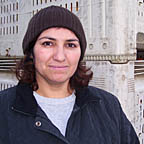
My husband and I have three children ranging in ages from six to sixteen years old. I have worked in the citrus industry since 1991. My husband can’t work because he sustained an injury at work. We spent the holidays visiting family in Arizona, when we came back to California the citrus freeze was all over the news. We were caught off guard, we were not expecting it nor were we prepared. I’ve been able to work on and off but the packinghouse is expected to shut down operations in less than a week.
During the last citrus freeze my family and I received a lot of help from the UFW. They assisted us in getting help to make four months of our mortgage payments. We also got help with our utility bills. During the months of the freeze the UFW helped me find employment and my family received periodic food donations. I am confident that the UFW will help us get through this freeze once again.
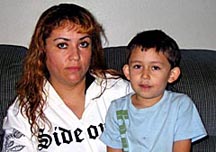
I worked for the company Charles Krug-Mondavi for 13 years.
I have four children, one that is 18 years, 14, 8, and 5 years and as of July 7, I was discharged from the company Charles Krug-Mondavi. I have had trouble in finding a stable and secure job given that I am currently working just a few hours or part-time without any type of benefits, like the ones I previously had for me and my family from the company that fired me.
Now that the holidays are coming, I feel worried for my children given that I am not sure as to whether I will be able to make them the dinner that I prepare for them every year or whether I will be able to give them any of the presents that are expected every year. With the little that I am able to work, I can barely afford to take home any food to them.
One of my major worries is that my children are currently without medical insurance and I cannot afford to provide them with medical insurance. First, because I do not have a medical plan at my work and second, because I can not afford to pay medical plan package given that it is too expensive.
What I most desire is to return to my former job so that I can continue the benefits that I had.
I am going to continue fighting until justice is served and so that these types of companies do not continue to exploit workers as if they were merely tools and so that they do not do away with us workers whenever they feel the need to do so. For these reasons I want to continue helping out so that the farm worker can be treated with dignity like a human being.
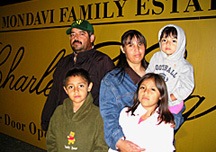
I worked for the company of Charles Krug Mondavi for 7 years.
Since the day I was discharged on July 7, 2006 of the company Charles Krug Mondavi I’ve been looking for a jog everywhere, but I’ve yet to find a stable one, in occasions I work once or twice a week as a day labourer, and for all of this, I feel very sad and depressed and especially now that the holidays are coming. All of this has impacted my family and I in a negative way.
Working as a day labourer once or twice is the only way that I could bring some food home to my kids, everyday that passes by, I’m not sure if it’ll be the same as the previous day, and all of this for not having stable job.
Regarding the holidays, I feel pity and sad because this Christmas will be different to other years, because my kids wont receive the presents that they did in previous years.
I will continue to fight to better our situation, and return back to normality, everyday I maintain a good faith and wish that the law could give a just failure for me and for my co-workers.

I am employed with Pandol & Sons for a labor contractor called J & B Pimental. I have been employed with them for 1 ½ years. My foreman’s name is Oscar and we work with the grapes doing field work.
I have been making $7.25 per hour working 38 hours per week sometimes less due to the type of work that we are doing right now.
I have a family of 4 this includes my wife that lives in Mexico. I have 3 teenagers, and my wife Margarita who I support in Mexico. I have not seen my family for four (4) years.
At the moment, I live with 5 of my relatives, my oldest son Guillermo, my daughter Margarita, her husband Miguel and my grandson Miguel Angel who is 3 years old. We pay $200.00 per adult for rent including utilities which is $800.00 per month. I have a vehicle, and sometimes I take one or two workers to work, and we all pitch in for gas. Because of the gas being so high we should get a little more for our pay, it’s just to much right now the way things are.
The last time I got a raise was about a month ago where they gave us $.25 cents raise. We get no benefits. And, the reason we got a raise was because the United Farm Workers were in the fields speaking to the workers.
I feel very pressured because I do not have enough money to see my family, and it makes me very sad that I can’t do more for them.

I work at Vignolo Farms, here in Delano, picking grapes. I have been working there two (2) years now, about eight months out of the year. I get paid at $7.35 an hour, with bonus at .35 cents per box.
I have been married for about 12 years now, and I have 6 children, ranging from 10 years to 14 months old. My wife works every now and then. With the income that we get per month, we find it hard making ends meet. The rent is high and so is the gas. We are thankful that our children are healthy and well. At times, when our children do get sick, we have to pay with money that we don’t have. This puts a strain on our ability to pay our basic necessities, but what are we to do?
Every now and then, I will talk with my family and friends about how low the wages are for the hard work that we do. At times, we help each other out by borrowing money when needed. This is sometimes embarrassing, because I know that my family or friend is making a sacrifice for my family. Life should not be lived like this.
It would be great for the company to pay us enough to be able to pay our bills, which are modest in comparison to what I see in the cities. I feel that for the hard work that we do, that we should be able to make ends meet, to pay all our bills and also be able to see our children in better circumstances.
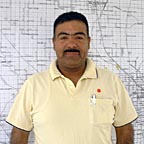
I work at Lucich Farms, which is located in Delano, Ca. I have been working there almost five (5) years now. I get paid at $7.35 an hour for the work that I do as a tractor driver, mechanic, general maintenance, in short, whatever needs to be done.
Every year, we have been asking the company for a raise, and every year the company says that they will be giving us one soon. But it never happens. This last time, it was in June of this year, he promised us again that a raise would be forth coming, but it has yet to happen. The last raise that we got was about 1 ½ years ago, when our hourly rate went from $7.00 to $7.35. Still, this is not enough money for the type of work that we do.
I have been married for 21 years and I have 5 children, ranging from 19 years to 11 years old. The money that I make I send at least half to Queretaro, Mexico, where my family is located. I have been here for almost 11 years and ever since then, my dream was to bring my family here to the United States, to be able to pursue a better livelihood. But because of the harsh working conditions, those dreams have slowly dissipated and I only think now of returning to my family sometime soon.
Right now, I am here to demand more respect for my fellow workers and for myself. There are times when we are spraying pesticides without the proper equipment. I have seen many of my co-workers get hurt at this farm and the supervisors do nothing but fire them and ignore their rights. There are many more injustices that have happened at the Lucich Farms, but I will only get more upset. I am tired of getting upset. I am here to do something about bringing change for ourselves.
We do not have vacations, holidays, no medical plan. Whenever we get hurt, we have to fend for ourselves in paying the bills. Every time we ask the company for a raise, they cry tears and find many ways to tell us that they can’t. But we know that they can.

I am married and mother of 3 sons. I have been working for the last 30 years at D’Arrigo Bros. Life has not been easy due to the wages I receive from there, I can barely pay for the most essential needs such as the rent and food. My children have gotten their education thru loans and up to date they are still paying for them, and as if that’s not enough.
I started working at 17 years old, back then the cost of living was much lower, for example the rent, food, gas, clothing, etc were much cheaper than today. Since then the cost of living has been going up year after year and for us women working for this company, they have not given us respect. I say this, because they have not given us the opportunity to apply to other better positions. Such positions as tractor driver, machine operator, forewomen or supervisor. We, women, have the capacity to do this type of work too. It is obvious that this company thinks that we, women, could only perform general labor. As I have been for the last 30 years with no opportunity to inspire to get a better position.
In addition, if the company would of signed a contract with the Union, we would have had a decent pension plan, wages and benefits that will be helpful when we are ready to retire.
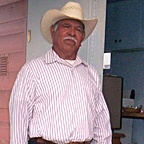
My name is Fidel Arriago, I am 62 years old I have worked for the company D’Arrigo for approximately 13 years picking broccoli. During all these years, I have never had any problems because I have always been a good worker and responsible season after season. But the company started to notice that season after season, I was getting older. The company is always trying to get rid of older workers, like me, and replacing them with young workers. With me, the first time they started pressuring me was in 2004 & 2005 thru the foreman, Sergio Treviño. He started asking more of me than the other workers. Clearly, he wanted me to quit my job because never before had he done this. They also, started making comments about my age. The first one that started was Sergio, he state to me, “no matter how, I will fire you from the company because you are too old.” I then complained with his supervisor, Conrado, and he stated to me, “if I were you, I would look for another job and leave this one. At that moment, Conrado called Pedro Santiago, General Supervisor of the broccoli. Pedro came and told me, “you just have to work harder because no one is going to bring your check home.” Insinuating that he was going to fire me.
In 2005, I spoke with John S of Human Resources who is in charge of the whole company. He told me that I needed to fix my problem with Pedro Santiago who is the general supervisor of the broccoli. Pedro then told me, “Arriaga, you need to recognize that you are too old, me too when I get to be your age, I will leave my spot to the young ones.” He made me feel ashamed of my self and I saw that no one was going to listen to me. So, then I asked the United Farm Workers Union for help and they took a declaration from me. They placed charges for age discrimination and up to this point they have not fired me. My work is all I have because the only thing I have is the trailer that I live in and if I am out of work, I don’t know what am I going to do to survive in this area that has a high cost of living.
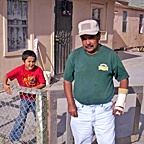
I live in Salinas, California with my family which consist of my wife, my son and 2 grandchildren. In this county life is very expensive to live in; its very difficult to pay the rent, food and utilities.
I have approximately 14 years working with the company D’Arrigo. Fourteen years ago the cost of living was lower, for example, the rents during that time were $300 for a house with 2 bedrooms. At this time, the rent for a house with 2 bedrooms is $1500. It is very clear that the cost of living is much higher now. During those 14 years, we have not received a wage raise from the company. Which causes us, the workers, to be in a very difficult situation and we must share our homes with other families.
In my case the situation is much more difficult, because in June of this year, I got hurt at the company. The company sent me to their doctor and the doctor sent me back to work. And because I was hurt, the company lowered my wages. I have given part of my life to this company and I have always been a constant and responsible worker. And for something that was out of my control, I can no longer keep up with my co-workers. The company has made me feel ashamed by lowering my pay and letting me know that I am worth less than my co-workers. I work here and I make D’Arrigo richer. All this has happenedd because my hand was cut and I am not the only one that the company has done this to. They do this to all the workers who get hurt, they make us feel ashamed of ourselves.
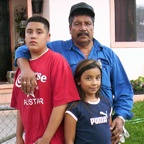
I live here with my wife, my 4 sons and 2 daughters. My wife & I work for the company D’Arrigo Bros. for past 25 years; picking broccoli.
We have given our best years to this company and during this whole time, the company instead of raising our wages, they have cut our wages.
This is not fair, that is why we got together with our co-workers and we are fighting to get a fair contract with better wages.
The cost of living is getting higher; right now the rents are costing $1500 or more. Even with the high cost of living, this unfair company is proposing to freeze our wages for the next three years.
For all these years, the company has refused to negotiate a fair contract and bargain in good faith with us (the workers) and the UFW union who represents us.
In the year 2000, we put charges against them for negotiating in bad faith and in 2005, the Judge found them guilty; ordering them, as a remedy, to pay us loss of wages and benefits from 2000 on and up to date, and will continue until the company negotiates in good faith with the UFW.
Instead of obeying the Judge’s orders, they appealed his decision with the Board of Directors of the ALRB. In such hearing, the Board of Directors of the ALRB agreed with the Judge’s decision and found them guilty of negotiating in bad faith and ordered them to continue with the previous order of paying the workers for the losses they have suffered.
On July 27, 2006, again we got together with the company and once again they came to negotiations proposing to freeze our wages for three years more. It is very obvious, that this company does not care of its workers sufferings. It does not care what the law is ordering them, they have always stepped all over us and they are stepping all over the law too.
It is time to make this unjust company respect us; we will continue fight until justice is done and we need your help.
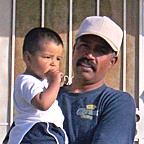
I live with my family together with 2 other families. We live together with 2 other families because the economic situation is very difficult in this area. Where a 3 rooms house rent value is $1500 to $1800 per month, this is one of the most expensive areas to live in.
At this time, I work for D’Arrigo Bros Company. This company has operations in Monterey County, Huron, Brawley, and Arizona.
Thie company employs about 3000 workers. Just in the Monterey County there is a workforce of around 2000 workers.
I have worked for this company since 1991–that make a total of 15 years of service for this company.
In 1994, I got fully involved with the negotiating committee of this company. They were fighting with the company to have a fair contract with the United Farm Workers union–UFW.
Since that time, the company has shown no desired to develop a good relationship with the workers and the union. To the contrary, the company has made negative changes that affect most of the workers.
Starting with the example that in the 15 years that I have been working for the company, we have not received a wage increase; to the contrary, in some classifications the company has lowered the wages with the excuse that the company spent too much money in buying machinery.
For all this time, the company has been proposing in the contract negotiations, no increases for 3 years. They are also proposing to have the right to discharge or discipline workers for whatever reason. Refusing to accept the standard clause of just cause and not to mention the right to release all the workforce with labor contractor workers outside of the contract.
In 2000, by evaluating the company’s proposals and attitude, we felt that the company was not respecting us and we decided to file charges against the company negotiating in bad faith.
In 2004, we had the hearings against the company and in 2005, we got a favorable decision. In such decision, the judge determined that for all this time the company has been negotiating in bad faith. His order includes a make whole the company has to pay loss of wages and benefits to the workers. Also, he ordered the company to negotiate in good faith with the union or the make whole will continue.
The company appealed this decision to the ALRB executive board. The ALRB board in their decision, re-affirmed the judge’s decision and ordered the company again, to pay the workers loss of wages and benefits and to negotiate a contract in good faith.
On July 27, 2006, we held another negotiation meeting with the company, to our surprise, the company again came back to the negotiations proposing no wage increases for 3 years. Again not accepting the concept of the just cause to discipline and discharge; and proposing the right to replace all current workers with labor contractor, if they want.
In some of the working areas, the company is proposing the minimum wage of $6.75 per hour. How can anybody live with this salary?
The company also owed us, the workers, alot of money because the company was found guilty of the charges that were filed.–for forcing us, the workers, to use the company’s buses to go to work to the different ranches. The company was using our time the way they felt like it without paying a penny for it.
There were situations where the company would discipline workers if they did not show up at 6:00 a.m. but they would start paying us at 7:00 a.m.
In this case, the company was found guilty but the same way that the company found excuses in negotiations, they have used so many tactics to avoid paying the money they owe us. In summary they have not paid us.
It’s very clear that this company has no respect for anybody, to accomplish their goal of making millions of dollars in profit. They do not care about their workers, they do not care about the law. They will step on anybody who is in their way to make their profit. We have been dealing with this unfair company and we are going to keep fighting but we need your help.

I began to work with the Company Charles Krug Mondavi on September 5, 1973. I now have 33 years serving this Company as a Equipment Operator and doing general labor.
When I began working at this Company, the treatment I received was harsh, discriminatory, and I received a lot of pressure from the Supervisors. The Supervisors demanded a lot of work and in return they gave us bad treatment.
These injustices made us workers want to organize ourselves and want representation from Cesar Chavez’s United Farm Workers in 1975.
After the election in 1975, the Company fought hard against us, negating itself to negotiate a contract with the United Farm Workers. For these reasons, we did not win our first contract until 1981, six years after winning the election. During this time, the Company discharged many workers as a form of retaliation to the results of our election in 1975.
In 1991, the third contract that we had signed with Charles Krug Mondavi expired and the Company refused to re-negotiate the next contract. We fought for 8 years without a contract. During this period, the Company focused on discharging many of the workers with higher seniority. I noticed that the Supervisors of the Company enjoyed the fact that these types of workers were being discharged and that they used this as a way to intimidate us older workers. This is similar to what is occurring right now in the Company.
The Company via its Supervisors is demanding large amounts of work from us workers, where on occasions this pressure prevents ourselves from going to drink water, going to the restroom and this because in order to comply with the standards of production that the Company is asking of us. I think that the Company is doing this with the intention that we will quit our jobs. This way the Company can replace us with a younger work force. This is where I feel insulted and discriminated by the Company against us workers who have given a great number of years of service and best years of our life to this Company.
It is very clear that the Company wants workers that will last longer than us.
I am a member of the Negotiating Committee and I have participated in the only three meetings to which the Company has called us to meet to re-negotiate the contract that expired on December 31, 2005. What I have seen in these meetings is that the Company is solely looking after their personal interests and is not seeing the necessities nor the interests of the workers. One of the issues that the Company is proposing in the Negotiations is that the workers receive periodic physical capacity exams every three months.
I feel frustrated and angry at the Company, for their wanting to take severe decisions including termination if we do not pass such physical capacity exams. This after having turned over 33 years of my life and service to the Company and now the Company wants to compensate me by kicking me out into the street.
On November 7, 2005 we had our last negotiation meeting and the Company has not contacted us to resume negotiations nor have they responded to our last proposal that was submitted to them on this day. It is very clear that the Company wants to do the same that was done to us in 1991 but now even more shameless because the Company wants to throw me and my co-workers out onto the street. In every one of these meetings, I have seen the bad faith to which the management at Charles Krug Mondavi has acted with.
I as a worker will continue to fight so that the Company does not discriminate against us because of our age and I will continue to aid my co-workers so that together we can protect the interests of ourselves and that of our families.
I declare under the penalty of perjury and under the laws of the state of California that the aforementioned is correct and true. Executed on May 30, 2006 in the City of Napa, CA in the County of Napa, CA.

In 1977 I began working as general labor worker before having been given the opportunity to be classified as an Equipment Operator in 2003. Currently I have been working for 29 years with the Company Charles Krug Mondavi.
During my time working with the Company, I have seen that the Company has always wanted to fight against the organization of the workers. The largest period of time in which the Company attempted to get rid of our Union was during the 1990’s when we went 8 years without a contract.
It wasn’t until Marc Mondavi, one of the proprietors and sons of the owner Peter Mondavi, Sr. during a vigil in front of the winery organized by myself and my co-workers to pressure the Company to sign a just contract, shoved one of my co-workers towards the highway, tore up some of our flags and banners that forced the Company to feel obligated to have to sign a contract with our United Farm Workers in order to wipe its hands clean of these actions of bad faith against us workers.
Presently, the Company continues with this same mentality of attempting to hurt the workers. I feel the Company has always been searching for ways on how to take out our Union, which took us 6 years from the date of our election in 1975, for us reach our first contract with the Company in 1981.
Now, I think the Company is attempting to get rid of us because of our age. I think the Company has seen the leadership that us older workers carry. Those of us who have given the most and best number of years of service to the Company have been able to guide and instruct our co-workers on how to protect and advocate their labor rights. In other words, the Company has seen that they have not been able to break our unity, now they want to breaks us using our age.
Besides the fact that I think that the Company thinks that because of my age that I can no longer work and produce as a younger worker, the Company simply wants to do away with our Union that has represented us and fought for our benefits. The Company wants to implement a younger work force, that will carry lower wages, no benefits, and will hold a lesser amount of knowledge of their labor rights to which they will in effect be making themselves vulnerable to the requests and demands of the Company.
I declare under the penalty of perjury and under the laws of the State of California that the aforementioned is correct and true. Executed on May 30, 2006 in the City of Napa, CA in the County of Napa, CA.
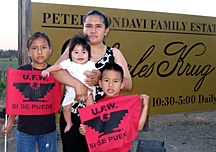
I have worked for four (4) years at Charles Krug Mondavi. In the month of July of 2005, I reported to Mr. Jose Martinez, Supervisor of Charles Krug Mondavi, that I was pregnant. I reported this to him with the intention so that I would not be put to work with shovel work because it is a heavy duty job for us women to do and at the same time I wanted to take care of my state of pregnancy and therefore asked to be given light duty work to carry out. However, Supervisor Jose Martinez did not issue me a response and so I continued to work as normal.
Later, Supervisor Jose Martinez began to ask me every week, two to three days a week, for notes from my doctor regarding my pregnancy.
Approximately, two weeks later, I went to my family’s doctor to request a note for work. The Doctor issued the note directly to the Office of Human Resources of the Company Charles Krug Mondavi. This same day, August 26, 2005, Supervisor Jose Martinez, notified me that I not report to work the following day despite the note still authorizing me to conduct light duty work but the Company did not respect this note. Supervisor Jose Martinez told me “not to worry, your job is secure, after you give birth, just bring me a note from your doctor and you will have job upon return.”
After my son was born on March 8, 2006, my doctor authorized my return to work on April 24, 2006. I turned this note into my Foreman Floriano Tavares as I had been instructed to do so via telephone by Supervisor Jose Martinez. That same evening I called Supervisor Jose Martinez to reconfirm that I had already turned in my doctor’s note to my Foreman Floriano Tavares. Supervisor Jose Martinez asked that I call him next day. The next day, I did call Supervisor Jose Martinez, and I was told by him that he had not yet received instructions from the Company authorizing my return to work and he said he would call me later.
I waited for a couple of days for the phone call from Supervisor Jose Martinez but he never called me. I then contacted the United Farm Workers, who are our Union Representatives, and spoke with Mr. Roberto Garcia. I reported to Mr. Roberto Garcia that I was ready to return to work and that I had already turned in my doctor’s note that authorized my return to work. Mr. Roberto Garcia responded that he had just received the seniority list of the farm workers from Charles Krug Mondavi, but that my name no longer appeared on the list. I am aware that when one’s name does not appear on the seniority list, that that means that one is practically discharged. Mr. Roberto Garcia said he would investigate this issue more deeply. Three days later, Mr. Roberto Garcia came to visit me personally and demonstrated to me a memo from the Company that said that I had already gone 32 weeks past my approved maternity leave of absence and that for that reason, I had lost my job.
Upon hearing this, I felt very bad and I felt discriminated because after having complied with the procedure of turning in doctor’s notes I could not believe the injustice that the Company was committing against me.
In fact I was ready before the 32 weeks to which Company claims that I have passed. I felt offended and frustrated and more because I want to continue working. I have kids and I need to provide for food, dress, and all of the necessities of the family.
I think the Company is attempting to get rid of everyone of us workers and not because I am a women means that I am going to let the Company discriminate me in this manner.
At this time, our Union is trying to re-negotiate a contract with the Company and I am aware that the Company is fighting back and rejecting the proposals that we are presenting. I feel that the Company is searching for opportunities to get rid of us workers.
I am also aware that each year Charles Krug Mondavi gets richer with the work that we produce and I feel that us, the workers, are not of importance to them and they solely want to exploit us for our labor.
Our newborns that come to this world should not be at fault that our management from Charles Krug Mondavi want to create a disorder affecting our sons and daughters, families, and ourselves as workers.
I will continue standing up for my rights so that they will be respected together with those of my co-workers because I am not the only one who has gone through this situation, because there are others who have been discharged for the same reasons.
I declare under the penalty of perjury under the laws of the State of California that the aforementioned is correct and true. Executed on May 26, 2006 in the city of Napa, CA in the County of Napa, CA
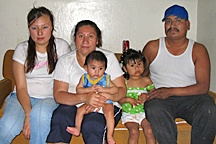
In 2001, I began working as a general labor worker, where I now have worked for 5 years at the Company Charles Krug Mondavi. In the month of June 2005, I was given my maternity leave of absence to give birth to my son who unfortunately was born prematurely on December 19, 2005 and because of the delicacy of the situation required that I take care.
I turned in a doctor’s note to my foremen Floriano Tavares and he turned it in to Supervisor Jose Martinez. Jose Martinez then told my husband Juan Fregoso, also a general labor worker at Charles Krug Mondavi, that I should take my maternity leave because I had already received the permission to do so.
My son was then born on December 19, 2005.
In the third week of the month of April 2006, Mr. Roberto Garcia, Representative from the United Farm Workers came to visit me personally and asked me whether I had quit my job with the Company because my name no longer appeared on the seniority list.
I replied to Mr. Roberto Garcia that I had not, and that I was simply on maternity leave. Supervisor Jose Martinez had told me to take the necessary time to tend to my pregnancy because the Company had received my doctor’s note.
Mr. Roberto Garcia responded that he was solely notifying me of what the Company was doing in removing me from the seniority list which basically meant that I had been terminated.
I felt very bad and disgusted because it could not be possible that the management at Charles Krug Mondavi could not understand a women’s necessity to take and be on maternity leave. For that reason, I felt not only insulted but discriminated by the actions that the Company was taking against the rights that I have.
In addition, I think that the Company has been acting in a bad manner against us workers in general because year after year, I have seen less co-workers working around me and I have not known the reasons for which the Company has been interested in getting rid of us via any opportunity that they see.
The Company has been discharging the workers and I feel that now I am going through this situation and I feel insulted because I have complied with the required procedure as deemed appropriate by law. I feel that they are basic human rights.
In the month of February of 2006, the doctor gave me a note regarding my ability to return to work. My husband turned in this note to my Foremen Floriano Tavares who then turned it into my Supervisor Jose Martinez.
Up to this date, I have not been recalled to report to work. With these types of actions on the part of the Company it is evident that we have never been respected, every day they focus instead on how they can make themselves richer and to them the workers are not important to them, they solely want to exploit us like slaves.
I declare under the penalty of perjury and under the laws of the State of California, that the aforementioned is correct and true. Executed on May 26, 2006 in the City of Napa, CA in the County of Napa, CA.